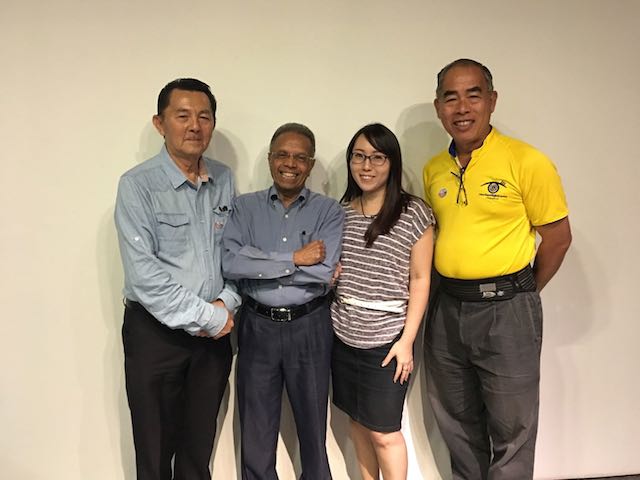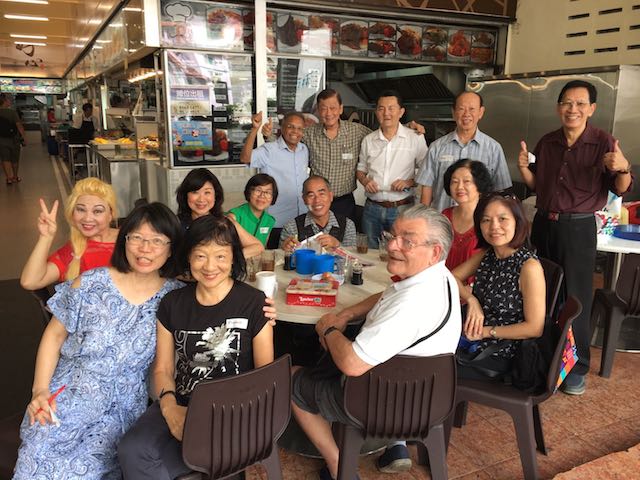Banking on relationships
This senior is rich in his bank, not the money bank but the relationship bank. Building positive relationships is what he is passionate about and hopes he can convince others too.
BY: Eleanor Yap

Dexter Tai, left, standing beside R M Gerald, Carol Kuan (a member of the relationship banking committee) and Koh Keow Chai.
There is more to life than money. We should all know this, yet, we tend to forget as we go through our day-to-day lives. A reminder would surely help and that is what Dexter Tai, 76, is banking on. “Currently, people are too focused on money and money-related issues. I feel relationships and money should go side-by-side, though I think relationships are more important.
“As much as you are successful in your money bank, you also need to be successful in your relationship bank, or else you will fail in life. Relationships is about wanting to be one’s friend, not for ulterior motives but to make quality friendships.”
He has coined a term called “relationship banking” to help encourage everyone, including seniors, to practise the importance of building positive relationships in their lives using the same principles of earning money, such as time, effort and ability. He shared: “I often meet people and hope they will potentially be my friends. In that, you can then enjoy their company. Relationship banking is an instant benefit, rather than money banking which is when you need to earn it, bank it and spend it.
“I spend time with friends and strangers to get to know them so as to accumulate in my relationship bank. I use my effort to spend on social interaction and with my abilities, I persuade people to be my friends.”
The impetus
He didn’t feel this strongly about the importance of relationships when he was younger, but it was at the age 13 when his headmaster posed him a pivotal question – “is the world better with you or without you?” Dexter explained, “I interpreted that question that if you want to help yourself, you need to help others. That was the seed that was planted on relationship banking.”
And at the age 18, he went against his domineering father who wanted to see Dexter strive in a profession such as an engineer or a doctor, professions that parents even today envision their children in. “I didn’t want to go into such a profession and I wasn’t confident, however, I agreed to it as it was the only way that my father would finance my education abroad.”
He went to a university in Sydney to study medicine in hopes of someday becoming a doctor, but after a couple of years, he failed. So, to please his father, he went on to yet another “profession” – architecture. However, he quit after only studying one term and enrolled into night school to take a certificate course in business principles. “I felt that I wanted to gain my own stride and confidence, and that if I studied what I wanted, I would pass.” He did that, achieving this on his own, however, with dire consequences – “my father cut me off and I had to finance myself.”
Despite not having a degree but just a certificate, he still managed to get a job with Xerox as a salesman when he returned to Singapore. “I got that job without being a graduate and along the way, I convinced them that you didn’t need a degree to succeed but what was more important was excelling in your relationship bank to serve the customers and get along with colleagues.”
Be a relationship banker
Now in his Third Age and finding fulfilment in his retirement, Dexter is more determined than ever to spread the idea of relationship banking to others. “The purpose of money is to make use of it and enjoy it to get the benefit. Unless you get the benefit, it then becomes useful. People die with their millions – remember the popular saying – you can’t take your money with you when you die. Money is often used for materialistic purposes.”
He shared that he isn’t a money hater as one might believe and admits that when he was working, he too enjoyed the rewards that money brought him. “I am not saying money is bad as you need money for one’s needs and wants. What I am saying is it is only half of one’s life; the other half should be about relationships.” Hence, the equal portions of his term, relationship banking.
Dexter further explained how he uses the concept of relationship banking in his life. He was recently introduced to an architectural researcher from Germany, who was going to be in Singapore. He not only wrote to her to ask her if he could pick her up from the airport, he also invited her to have a meal, and knowing she is doing research, he even offered to link her up with his architectural contacts. “It is about giving relationships at least the same value as money and a way of life in family, business and community, and to live each day with purpose and meaning.” With society moving towards a knowledge-based economy, human talent is becoming ever more important, and that includes building relationships. Dexter’s idea of relationship banking couldn’t be more opportune.
He has even taken his idea one step further by starting an informal group of relationship bankers, mostly seniors, in December 2013 that meets once a week at YMCA, where they enjoy each others’ company and encourage each other on active ageing and lifelong learning. The response was so positive that over the years, about 200 people have attended one or two meetings. And with his passionate relationship bankers, retirees R M Gerald, 76, and Koh Keow Chai, 65, at his side, together they have started a committee of six (which this writer is a part of) which meets monthly to see how they can nudge the concept further. “I really want to share the benefits of relationship banking with others,” said Dexter. “It is a life concept, which makes no sense in keeping it to myself. It should be spread throughout the community.”
He added: “For seniors who have enough money, it is about not chasing after more money but focusing on the qualities of life including active ageing and lifelong learning, and filling up the relationship bank. By adding these aspects and volunteering, you benefit by having a happy and long life with health, confidence and hope.” Last year, the group got together to volunteer, bringing joy to the elderly at St Vincent’s Home.
If coming together, however, isn’t your cup of tea, there is no excuse to incorporating the concept of relationship banking into your life. Dexter suggested: “You can agree to meet with one of your friends for coffee once a week at the same time and place so you don’t keep reminding each other. Invite your family and friends to drop in at the meeting so it would grow further. This should be more of a long-term approach than short-term.”
By building positive relationships, it increases happiness and improves the quality of life of all parties, isn’t that an idea worth spreading? As Gerald put it succinctly: “Whenever we are feeling down or celebrating success, it is the people around us that make a whole world of difference. Our hearts should be for people … and not for things.”
|
SIDEBOX: My view Kwek Li Lian, 63, is part of Dexter’s relationship banking group. She shared this: “The way the relationship banking platform itself has continued to take shape from being a mere thought inside someone’s head to morphing into something less abstract, becoming more tangible, more relatable, is worth celebrating.
Some of us have been ‘accidental’ practitioners without even knowing it. It was something we felt needed to be done in the course of living our lives being a daughter, a sister, a wife and a mother. It seemed right. Call it filial piety, moral obligation, a sense of duty even. In each phase of our lives, we plodded along doing what was right. Never, or almost never expecting any returns. Now there’s a name for it. And it doesn’t sound half bad. Relationship banking. You can’t see it. But it’s real. And it’s here to stay. There’s a message to be told and told honourably, with conviction. Let’s do it. Together.
Why is this even relevant in this day and age? This begs the question why is it not? It is relevant more so now as we navigate relationships through cyber airways. We text instead of seeing someone face-to-face. We Skype, we WhatsApp, we Twitter, Facebooking as we get through our daily lives, sometimes telling complete strangers what we had for lunch with an unprecedented sense of familiarity as if we have known them for years and they in turn ‘follow’ us in our daily blogs. And yet we have no real conversations with those closest to us. Our family, our friends. Is it easier when you don’t need to engage someone eye-to-eye on a level which connects one’s soul to another? Because it is so superficial, there’s no accountability. There is no banking. We forsake that all important handshake, a hug, that gleam in the eye, that childlike bewilderment, that all knowing smile, that rapturous laughter. This surely cannot be substituted with a silly emoticon at the end of a WhatsApp message. Come on. It doesn’t work that way. Real people need real interaction on a daily basis. Relationships need sustenance and nurturing. You cannot do it by remote. No way. No how.”
|
** For those interested in joining the relationship banking group, e-mail Dexter at: dextertai07@gmail.com.


Hi.
When one makes lots of money, putting them into his Money Bank, one becomes a millionaire, a billionaire and even a zillionaire. Many rich and famous people, unfortunately and sadly, may not be happy in life because of poor levels of relationship with parents, spouse, children, friends, relatives, neighbours or colleagues…..
When one works hard on his Relationship Bank, his RB account will similarly accumulate and becomes thick. He or she will become a Nillionaire.
Nillionaire, from the word Nil (zero, nothing) with no physical money to count….but Nillionaires are happy, may have no money in his Money Bank, but have lots of friends.
I proudly declare I have worked hard on my RB….today I am a Nillionaire !
Nillion Koh
RB is very much like a violin: after the sweet music is over, the strings are still attached – a union of souls; a union of hearts; a union of minds; and a union of thoughts. Those union dues are banked in RB.